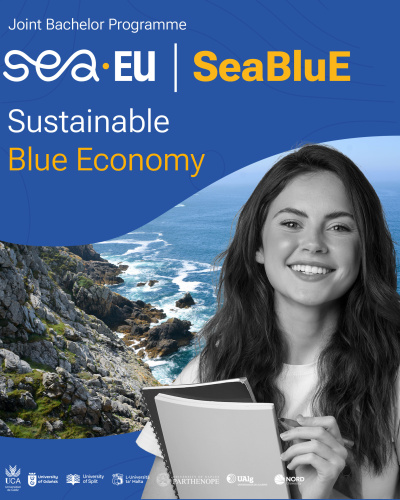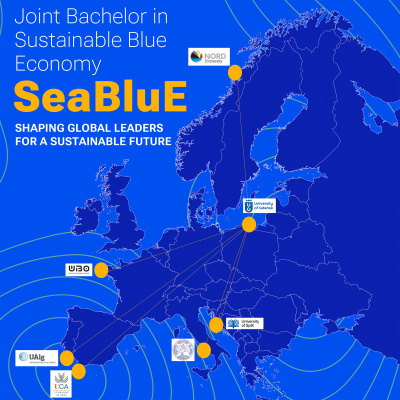
Designed for the job market, based on mobility and thoroughly international, the first-cycle degree programme in Sustainable Blue Economy (Sea-BluE) is the ideal choice for anyone who wants to start a career in the maritime industry. This unique joint degree programme of the SEA-EU alliance was created by seven European maritime universities and trains future leaders of the blue economy.
Start your academic adventure with SeaBluE – enrol today!
‘Today's rapidly changing world expects employees to adapt quickly to change and to have broad, multidimensional knowledge and skills. High school graduates often have trouble deciding what to study in order to find a job later on,’ says the Dean of the Faculty of Management at the University of Gdańsk and coordinator of Sea-BluE at the University of Gdańsk, dr hab. Angelika Kędzierska-Szczepaniak, prof. UG. ‘Sea-BluE studies meet their expectations because they combine studies related to the maritime economy with the basics of management and business, additionally in an international atmosphere.’
Learn the basics - develop your skills - choose a specialisation!
By choosing Sea-BluE, students embark on a well-thought-out development path, where each year of study is devoted to acquiring a different set of competencies.
‘The first year of study is a time to acquire basic knowledge in subjects related to maritime economy, but also business management. The second year is devoted to gaining a deeper understanding of the tools that enable risk assessment, financial management, sustainable development, climate change, accounting and sustainable reporting. The third and final year of study is focused on specific specialisation paths,’ explains prof. Angelika Kędzierska-Szczepaniak.
In the third year of Sea-BluE, students will be able to choose one of six specialisations offered at various partner universities of the SEA-EU alliance:
- Blue Sustainability: Accounting, Management and Planning - Parthenope University of Naples and University of Gdańsk
- Protection and Sustainable Use of Marine Resources - University of Gdańsk
- Human Impact on the Arctic - Nord University
- Sustainable Port and Tourist Cities - University of Split
- Blue Management: Accounting, Protection and Restoration - University of Cádiz
- Blue Industries: Tourism and Seafood - University of Algarve and University of Cádiz
Based on mobility

Sea-BluE is the result of many years of cooperation between SEA-EU partner universities. The programme combines the potential, experience and knowledge of researchers and teachers from the University of Gdańsk, the University of Cádiz, the University of Split, Nord University, the University of Algarve and the Parthenope University of Naples.
Sea-BluE students will be able to choose between any of the above universities. For example, in October 2025, they will begin their studies at the University of Cádiz, spend their second year at the University of Algarve, and during their third year, depending on their chosen specialisation, they will be able to continue their studies at any of the six European coastal universities.
- First year - choice of: University of Cádiz, Parthenope University of Naples and University of Gdańsk
- Second year - University of Algarve (for students who spent their first year at the University of Cádiz), Parthenope University in Naples (continuation after the first year) and University of Gdańsk (continuation after the first year)
Third year - Depending on the chosen specialisation, students can spend their third year at one of six universities:
- University of Cádiz, University of Algarve, Parthenope University in Naples, University of Gdańsk, University of Split and NORD University.
Tailored to the job market
The curriculum of the Sea-BluE programme was consulted with representatives of businesses in the broadly understood maritime industry. The creators of the programme asked employers about the most sought-after skills in employees. In addition to the knowledge and skills necessary in the industry, Sea-BluE graduates will also obtain a bachelor's degree and a diploma of completion of a joint programme of the European University, signed by seven coastal universities, which will distinguish them on the labour market.
‘The international character of the programme means that from the very first days, students find themselves in a very diverse environment - such experience is currently very much needed on the labour market,’ adds prof. Angelika Kędzierska-Szczepaniak.
What are European University Alliances?
The idea of creating European Universities was conceived during a meeting of European Union leaders in Gothenburg in 2017. Even then, the creation of joint study programmes was identified as one of the most important goals of this initiative. Less than two years later, in 2019, hundreds of European universities associated in alliances began work on building universities of the future, based on mobility, sustainable development and the sharing of knowledge and good practices, among other things. In 2019, the University of Gdańsk was one of the first Polish universities to join the programme and has been cooperating for 5 years within the SEA-EU European coastal alliance.
